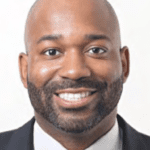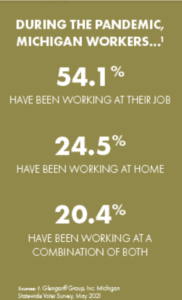Listen Closely
January 4, 2022NEW WORKPLACE NEEDS TO BE MORE ATTUNED TO EMPLOYEES’ TOTAL NEEDS
By Paul Vachon
 For Dr. Lars Johnson, assistant professor of psychology at Wayne State University, the most effective way for employers to address the current labor circumstances is to listen closely to the personal concerns of workers and potential hires.
For Dr. Lars Johnson, assistant professor of psychology at Wayne State University, the most effective way for employers to address the current labor circumstances is to listen closely to the personal concerns of workers and potential hires.
In his view, the post-pandemic economy presents an opportunity for employers to rewrite the traditional social contract between management and worker. The new model will need to be much more attuned to employees’ total needs. These include concerns over workplace safety, flexible scheduling, adequate compensation, and greater respect for employee work-life balance.
ON A DAILY BASIS WE ARE REMINDED OF THE SHORTAGE OF WORKERS ACROSS INDUSTRIES. COMMENT ON THE REASONS FOR THE HESITANCY TO RETURN TO WORK.
The pandemic forced people into their homes and out of their normal work routines, due to either remote work, layoff, or termination, so people had to find alternate modes of work. The pandemic shifted the labor market in ways we couldn’t account for. People realized the conditions in which they worked were problematic.
In response, there are a lot more gig workers out there, and many partnered people found ways to survive on one income. So, a lot of workers are deciding not to come back because they’re accustomed to the new ways they’ve structured their lives.
HOW HAS THE COVID-19 PANDEMIC AND ITS ECONOMIC AND SOCIAL CONSEQUENCES CHANGED WORKERS’ RELATIONSHIPS WITH THEIR EMPLOYERS?
In the past, some employers have convinced workers that they’re powerless. Organizations’ central goal was to motivate employees to do as much work as possible for a limited number of benefits—that’s the profit-driven model. But the power has always been in the employees’ hands, but not in the hands of a single employee.
An important phrase in my field was coined by psychologist Ben Schneider and that is “the people make the place.” Without the people, there is no organization. So when people decide en masse not to deal with any form of abuse, leaders have to listen. The concern is much more heightened than it was in 2019. The nature of work is different, and the old model no longer works.
DO YOU SEE THE EMERGENCE OF THESE CHANGES AS THE BEGINNING OF A LONG-TERM TREND?
I would hope so. It gives business leaders an opportunity to really listen to the needs of their employees. But there’s no one-size-fits-all organization. “A” can’t necessarily lend its policies to organization “B.” We have to develop the ethos of an organization around the needs of its employees. I think that employers that are empathetic, that work with employees to create flexible work arrangements will reap benefits sooner rather than later.
We also need to shift away from the idea that these are things employers are giving their employees as perks, like flexible benefits and the opportunity to voice their concerns. These things should be come embedded into the fabric of the organization.
Paul Vachon is a freelance writer in Metro Detroit.

